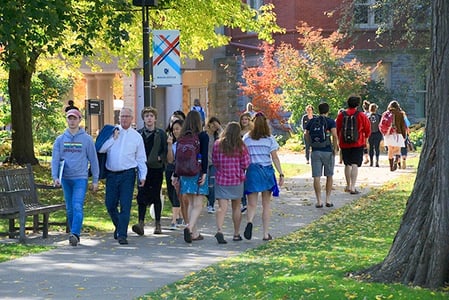
April 19 2018
While postsecondary institutions invest significant effort and resources in understanding why students leave, a more important but often ignored question is why students choose to stay. We know retention is important to your college or university; what predicts retention and student success?
Over the last several years Credo has conducted the Why Students Stay study with small independent colleges to uncover what institutional attributes and practices led students to return and persist to graduation.
Taking our cue from both positive psychology (studying the conditions that support flourishing rather than the conditions that debilitate individuals) and appreciative inquiry (affirming those systems and characteristics that are working well), our research has uncovered seven predictors of student retention:
- Identity – individual student traits, such self-theories, goal commitment, institutional commitment, interests, talents, and prior academic achievement.
- Academic Integration – making connections with faculty, experiencing academic engagement, and developing a sense of academic control.
- Value Proposition – feeling financially supported by the institution and believing that the education they are receiving is a good value for the money.
- Social Integration – having a sense of community and belonging.
- Support from Family and Friends – having sources of support external to the institution.
- Satisfaction – contentment with activities and facilities.
- Space and Place – having good experience with both academic and non-academic spaces on campuses.
While these seven factors all play a role in students deciding to return for the next semester, we found that how these factors play a role differs across institutions. While they had many attributes in common, no two campuses were alike in how they successfully retained students.
For example:
- For those campuses with large commuter populations, informal "third" spaces to gather between classes can be as important as the residence halls are for residential students in developing a sense of community and belonging. (Tip: Create third spaces for your adult and commuter students to find a sense of belonging, even if they don't have a res hall to go "home" to between classes. When students are comfortable, they are more likely to be retained and persist to graduation.)
- On many of the participating campuses, financial aid packages, net cost, the amount of federal loans, or students’ socioeconomic status didn’t matter as much as the value proposition, defined somewhat differently on each campus but consistently connected to meaningful learning leading to career preparation. (Tip: Lead admissions- and retention-based conversations with questions about the students' values and followup with how your institution's unique value proposition can meet their needs.)
- Institutions can leverage support from family to support student persistence, particularly those institutions serving large populations of first-generation families. (Tip: Engage parents, guardians, and siblings in orientations, first-year experience seminars/webinars, and letters of acceptance.)
While supporting students to graduation is a common goal among all institutions, our findings suggest that there is more than one way to achieve this. Like our students, every institution has its own unique characteristics and strengths, and the most successful learn how to recognize and optimize them. Ask advisors, professors, admissions counselors, student affairs officers, and other campus community members how they engage with students, and create momentum around the good ideas that are already working.
Not sure how to get started? Find out how to take the first step toward retaining your students by downloading our student success and retention brochure here.
Related Blog Posts
Recent Posts
- Richard Dunsworth, J.D., To Receive 12th Annual Courageous Leadership Award December 16 2024
- Meet the 2024 Credo Values Award Recipients August 27 2024
- What is Executive Coaching, Really? June 25 2024
- Credo & The Constructive Dialogue Institute Announce A New Partnership For Higher Education Leadership Development March 7 2024
- Celebrating Women And Gender-Diverse Learners & Leaders February 28 2024
Categories
- Strategy
- Leadership
- Student Success
- Student Success & Retention
- Enrollment
- Pivot
- Strategic Planning
- Leadership Development
- News
- Strategic Enrollment
- Campus Planning and Architecture
- Moving the Needle
- Data
- Research
- Retention
- Campus Master Planning
- Enrollment & Financial Aid
- Academic Programming
- Campus Planning
- Thriving
- Admitted Student Research
- Architecture
- Finance
- Advising
- Admissions




